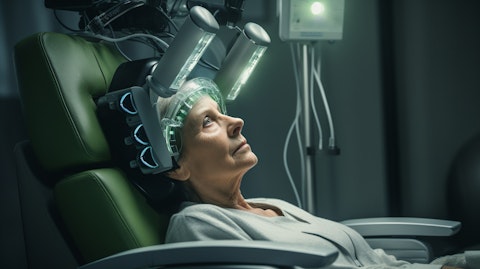IRIDEX Corporation (NASDAQ:IRIX) Q1 2024 Earnings Call Transcript May 17, 2024
Operator: Good day, and thank you for standing by. Welcome to Q1 2024 IRIDEX Earnings Conference Call. At this time all participants are in a listen-only mode. After the speaker’s presentation there will be a question-and-answer session. [Operator Instructions] Please be advised that today’s conference is being recorded. I would now like to hand the conference over to your speaker today, Trip Taylor, Investor Relations. Please go ahead.
Trip Taylor: Thank you, and thank you all for participating in today’s call. Joining me are David Bruce, Chief Executive Officer; and Fuad Ahmad, Interim Chief Financial Officer. Earlier today, IRIDEX released financial results for the quarter ended March 30, 2024. A copy of the press release is available on the company’s website. Before we begin, I’d like to remind you that management will make statements during this call that include forward-looking statements within the meaning of the federal securities laws, which are made pursuant to the safe harbor provisions of the Private Securities Litigation Reform Act of 1995. Any statements made during this call are not statements of historical fact, including, but not limited to, statements concerning our strategic goals and priorities, product development matters, sales trends and the markets in which we operate.
All forward-looking statements are based upon our current estimates and various assumptions. These statements involve material risks and uncertainties that could cause actual results or events to materially differ from those anticipated or implied by these forward-looking statements. Accordingly, you should not place reliance on these statements. For a discussion of the risks and uncertainties associated with our business, please see our most recent Form 10-K and Form 10-Q filings with the SEC. IRIDEX disclaims any intention or obligation, except as required by law, to update or revise any financial projections or forward-looking statements, whether because of new information, future events or otherwise. This conference call contains time-sensitive information and is accurate only as of the live broadcast today, May 14, 2024.
And with that, I’ll turn the call over to Dave.
David Bruce: Good afternoon, and thank you all for joining us today. I’ll start by extending upon the strategic review discussion in the press release. IRIDEX is actively engaged in a strategic review process, and the company is committed to pursuing a transaction or a series of transactions that will benefit our stockholders. Discussions are ongoing with multiple parties relating to both specific product lines or the entire company. The initial transaction we had referred to on our last call related to the sale of certain assets will not be going forward. As a result of that process ending, discussions with other parties are now moving to the fore. Obviously, the process is dynamic. And at this time, there are no further updates on the status or timing of potential transactions.
As we’ve said before, we’re committed to pursuing all available options to unlock value for our stockholders. Our retina business continues to enjoy a global leadership position in both market share and installed base for ophthalmic laser treatment systems used by retina specialists. Over IRIDEX’s 30-year history, the company has developed products that have set the technical and clinical standards in our space. We’ve recently refreshed the portfolio with the launch of the new Pascal laser scanning platform with MicroPulse capability and have followed that with the current rollout of our new single spot platform. In glaucoma, we’ve been the leading provider of non-incisional transscleral laser treatment. This began with the G-Probe cyclophotocoagulation treatment for late-stage glaucoma patients and has extended to include our MicroPulse transscleral laser therapy for moderate to advanced stage glaucoma patients.
Since launching MP-TLT, we have driven adoption by developing clinical evidence and real-world user success to steadily expand our worldwide market presence to over 2,000 glaucoma laser consoles, and delivered over 250,000 single-use probes. Notwithstanding the current market headwinds that are impacting many capital equipment companies, we remain focused on executing our business line growth strategies to drive further adoption and utilization of both our retina and glaucoma technologies. Together, our product portfolio is globally established with 1,000s of ophthalmic care providers around the world using our technology daily to treat their patients. We believe this portfolio embodies significant value, and we’re pursuing strategies to realize this value for stockholders.
I’ll turn now to a brief discussion of business developments in the first quarter. Total revenue was $11.8 million. While we saw some of the market firming we had been expecting, generally, longer sales cycles persisted into the first quarter, and we also experienced some end-of-quarter capital equipment purchase deferrals. So far, we’re seeing additional firming in the second quarter, as well as indications that a good portion of the orders that have been queuing up are expected to ship during the quarter. Solid growth from the sale of PASCAL Scanning Laser Systems and G6 probes internationally was offset by the deferrals and resulting revenue declines of other products. While the period of capital equipment softness has extended longer than we anticipated, IRIDEX’s position in our markets remains strong based on the differentiated features and clinical evidence supporting our technology.

Our refreshed retina portfolio, which includes the new IRIDEX 532 and 577 single spot laser platforms is generating customer interest that we expect to boost revenues in upcoming quarters plus further recovery driven by stabilized reimbursement for glaucoma procedures supports improved G6 probe sales. In glaucoma, Cyclo G6 revenue was $3.0 million compared to $3.7 million in the first quarter of 2023. We sold 13,300 G6 probes, representing sequential growth over the fourth quarter but a decrease compared to the prior year, which, as you know, was before the MACs created reimbursement concerns with their issuances and then withdrawals of their LCDs. Generally, we experienced some seasonality that usually results in Q1 coming in sequentially lower than Q4.
U.S. probe sales are moving back towards their prior order rates, while G6 system consoles continue lighter, indicating there remains concern in the market over the possibility of another round of LCDs. While we acknowledge the concern, we believe IRIDEX successfully defended its procedure reimbursement last year, and that’s, therefore, less likely that any new effort to restrict mix reimbursement will set back our well-established and proven non-incisional glaucoma laser procedures. In our retina segment, product revenue was $6.8 million, a decrease of 6% compared to the first quarter of 2023. Overall, we saw strong growth in sales of PASCAL scanning laser systems worldwide, offset by the longer sales cycles and equipment purchase deferrals.
As I mentioned earlier, the recovery from these deferrals appears to be continuing here in the second quarter, and we’re seeing firming of the system orders, plus we’re comfortable we have a supply chain adequate to fulfill them. To conclude, we expect continued improvement in the environmental factors that have been negatively affecting the business over the past several quarters. Receding concerns around reimbursement should support recovering U.S. glaucoma procedures. And probe sales and improving capital equipment trends, especially taking advantage of our opportunity with the new PASCAL scanning and single spot systems, should support a growth trajectory in our retina business. With that, I will turn the call over to Fuad.
Fuad Ahmad: Thank you, Dave. Good afternoon, everyone, and thank you for joining us today. I would like to begin by reviewing our financial performance for the first quarter ended March 30, 2024. Total revenue for the first quarter of fiscal 2024 was $11.8 million, down $1.9 million from the prior year period. The declines are primarily driven by the loss of royalty revenue and continued softness in the capital equipment purchases, resulting in lower system sales, along with the lingering Medicare reimbursement uncertainty and a strong seasonally — seasonality impacting our glaucoma procedures and system sales. The product level, total revenue from Cyclo G6 product family in the first quarter was $3 million, down $3.7 million, compared to the same period in 2023.
We sold 13,300 Cyclo G6 probes in the first quarter, representing an increase of 4% sequentially from the fourth quarter of ’23 led by strength in the international probe sales. The growth was offset by stronger seasonality in lingering reimbursement uncertainty phase that led to a decline of 10%, compared to the first quarter of 2023. We also note that the first quarter of 2023 was also a particularly strong comparable period for our glaucoma laser probes and systems. We sold 22 Cyclo G6 systems in the quarter, compared to 35 in the fourth quarter and 61 in the prior year period. The decline was largely due to the longer sales cycles and capital equipment purchase deferrals, as well as the reimbursement concerns in the U.S. Our retina product revenue in Q1 was $6.8 million, a decrease of 6% compared to the prior year period.
The decline was driven primarily by lower medical and surgical system sales, partially offset by higher PASCAL system revenue. Other revenue, which includes royalties, services and other legacy products decreased to $2 million in the first quarter from 2024 from $2.8 million in the first quarter of ’23. The decline was driven by decreased royalties due to the expiration of license patents and lower service revenue. Gross profit for the first quarter of 2024 was $4.5 million compared to $5.9 million in the prior year period. Gross margin was 37.9%, compared to 43.3% in the first quarter of 2023. The decline in gross margin was a result of lower overhead absorption on a smaller revenue base and a loss of royalty revenue. Operating expenses in the first quarter of 2024 were $7.8 million, a decrease compared to $8.3 million in the same period last year.
The decrease in operating expenses was a result of planned cost reduction initiatives, partially offset by $400,000 increase in expenses related to the strategic review process. Our net loss in the first quarter was — in the first quarter of 2024 was $3.5 million or $0.25 per share compared to a net loss of $2.1 million or $0.13 per share for the same period in 2023. Now on to our cash position and cash flows. Cash and cash equivalents totaled $5.4 million as of March 31 — March 30, 2024. The net cash reduction in the quarter was $1.6 million. The first quarter is typically higher quarterly cash usage given the timing of certain expenses, including annual compensation changes. We will continue to manage our capital prudently, including our decreased operating expenses and to support our strategic review and future operations.
With that, Dave and I would like to turn the call over to the operator for questions. Operator?
Q&A Session
Follow Iridex Corp (NASDAQ:IRIX)
Follow Iridex Corp (NASDAQ:IRIX)
Receive real-time insider trading and news alerts
Operator: Thank you. [Operator Instructions] Our first question comes from the line of Tom Stephan from Stifel.
Tom Stephan: Great, hey guys, Thanks for the questions. I’ll start off with the strategic review. Dave, maybe if you can elaborate on what happened with the asset sale that, I guess, is now off the table with what you’re willing to share. I guess I’m just curious how we should think about this in the context of other future potential transactions. Is there anything related to M&A appetite? Any more color you’d be willing to share?
David Bruce: Yes. Hi, Tom, thanks for the question. Yes, at the time we commented on the last earnings call, we believe the terms were converging toward an agreement. And we were in conversations and serious about reaching towards that agreement. Ultimately, the two parties didn’t agree on the terms to complete that transaction. These things happen, has not changed at all our focus on uncovering strategic value, and we have other parties with which we’re discussing, and we intend to focus on those now.
Tom Stephan: Got it. That’s helpful. And then shifting to G6, the probes were a bit above us. And I think I’m arriving at flat utilization quarter-over-quarter, which is a nice stabilization. Dave, maybe if you can elaborate a bit on the durability of the strength OUS. I believe that was the driver in the quarter. And then how we should, I guess, be thinking about a potential rebound here in the U.S.
David Bruce: Yes. So compared to the prior year, we had some strength in international. And compared to the prior quarter, we had strength in international. If you recall from our earnings announcement, we talked about a softness in inventory replenishment or essentially a reduction in inventories by our international distributors across the board, which included probes. And so the strength versus the first quarter of ’23 and the strength versus the first — the fourth quarter, we think reflects solid international demand and use of probes. Domestically, we did see some relative softness compared to the first quarter of 2023 on G6 probes. That was probably one of the last quarters before the initial LCD announcements occurred.
And as you know, the final announcement really came out during the fourth quarter. So we had some seasonal softness from fourth quarter to first quarter reflecting typical seasonality. It was roughly in line with that typical seasonal reduction. So we feel like the usage is supported our existing users continue to use, but we are seeing relatively slow movement as reflected by system sales toward new adoption. I think there are still some lingering concerns that the MACs will reintroduce. And while we don’t discount that likelihood, we think our ability to defend, as you recall, when LCD came out, we appealed and actually got a correction even before the effective date and the ultimate withdrawal of those LCDs. So we think our position on reimbursement this time around with LCDs will be strong, but I think customers, at this point, and potential adopters are taking a wait-and-see attitude.
Tom Stephan: Okay. Got it. And your customers have kind of communicated that the LCD uncertainty is maybe what’s holding them back from either purchasing a new system or using it?
David Bruce: Well, we have some regions where in the prior round, that those MACs did not have LCDs. And we’re seeing purchases and adoption in some of those areas and the others less strong. There’s a significant focus by administrators on how many procedures are going to be done, what’s the doctor’s commitment to use, and a question around what’s going to happen longer term. And I think that’s just causing people not to rush to purchase and wait and see how things unfold. Obviously, we have arguments in our favor that we convey in those situations and are continuing to work to attempt to drive that business forward.
Tom Stephan: Okay. Great. And then just on the outlook for 2024, I don’t believe you guided last quarter just given there was a potential asset sale coming soon. But now that, that’s off the table, I guess it’s normal course of business. So can you help us with how we should be modeling the rest of the year on revenue? Even directionally, should we be up? Should we be flat? Any color on 2024 revenue guidance now that we’re sort of back to normal course of business.
David Bruce: Yes. We’re still focused on executing on the strategic alternatives and having those discussions and seriously moving them forward at a rate that they can they can move and potentially transacting in coming quarters. And so we’re still focused on that priority with a clear additional focus on supporting and driving the business at hand. We do think there’s recovery occurring, and I alluded to some strength — continued strengthening in the second quarter and an observation that systems are — orders are firming up. We still have — we’re only halfway into the quarter, and a lot of capital equipment decisions get made late in the quarter. So there’s still some variability baked in even as we see enhanced recovery now.
So if those trends continue, that guides us toward reestablishing growth. And if reimbursement holds, I think that uncertainty subsides and we can see further adoption and broader usage by existing customers on the glaucoma side. So I think the environment is setting us up for that growth. We’re not forecasting specifically quarterly revenue or full year revenue at this stage, but I think that’s our trended anticipation.
Tom Stephan: Okay. Got it. And then last one for me, kind of a similar line of questions, but related to the balance sheet, Dave or Fuad, how should we be thinking about the cash balance on a quarter-to-quarter basis for the remainder of 2024? Just as we refine our models and as a follow-up to that, accounts payable, I saw, was up a pretty good clip quarter-over-quarter. Just wondering if there’s anything to call out there. Thanks.
Fuad Ahmad: Yes. So let me start, and then Dave can chime in with any additional color. So last year, we spent — we used approximately $7 million of cash. And towards the middle of last year, we actually began the process of rationalizing cost, operating expenses. And you’ll see a kind of full realization of those cost savings in fiscal 2024. So we expect our cash burn is going to be materially lower in 2024 than it was in 2023 based on the actions that we took last year. And obviously, we continue to look at efficiencies in our model. And I expect that we’ll continue to refine that throughout 2024. In terms of the — and so that’s where we are for 2024. In terms of the quarterly stuff, Q1, we used approximately $1.6 million.
It was typically — usually is a little higher cash burn for us at the beginning of the year for some of the investments we have to make at the beginning. We expect that in the future periods, it should be more muted given as we convert inventory into cash and some of the other steps that we’re taking. But I think it should be in that $1.5 million to $2 million range.
David Bruce: Yes. And I’ll just add, specifically, the boost in payables really is in response to some inventory increases that we had and as well as we’re experiencing, as I think many others are, push outs on our receivables as well. So we’re trying to balance our cash position by managing payables more in line with longer receivables. And then on top of that, we had a late quarter shift of the mix of products. So some product that we brought in to fulfill orders ended up not going out on orders. And others, we scrambled around to generate systems and shift those toward the end of the quarter. So that’s the combination of the inventory that we bought plus the last minute really caused our payables to be a fair amount larger than they had typically been running. I think in contrast to the prior quarter, they were somewhat lower. And so it looks maybe like a bigger jump than is — would be smoothed out on a quarterly basis.
Tom Stephan: All right. That’s helpful, color. Thanks for taking my questions.
David Bruce: Thank you.
Operator: Thank you. At this time, I would now like to turn the conference back over to Dave Bruce for closing remarks.
David Bruce: Thank you, operator, and thank you, everyone, for joining the call. We will remain focused on driving the business and pursuing the strategic process that we’ve committed to, and look forward to updating you in future calls.
Operator: This concludes today’s conference call. Thank you for participating. You may now disconnect.
Follow Iridex Corp (NASDAQ:IRIX)
Follow Iridex Corp (NASDAQ:IRIX)
Receive real-time insider trading and news alerts





